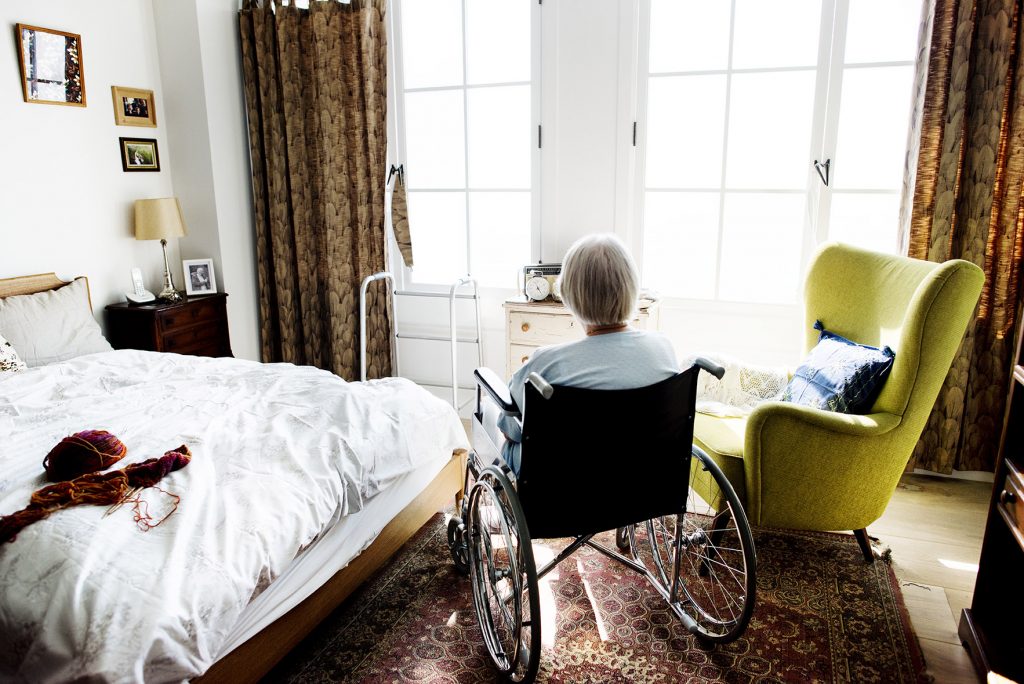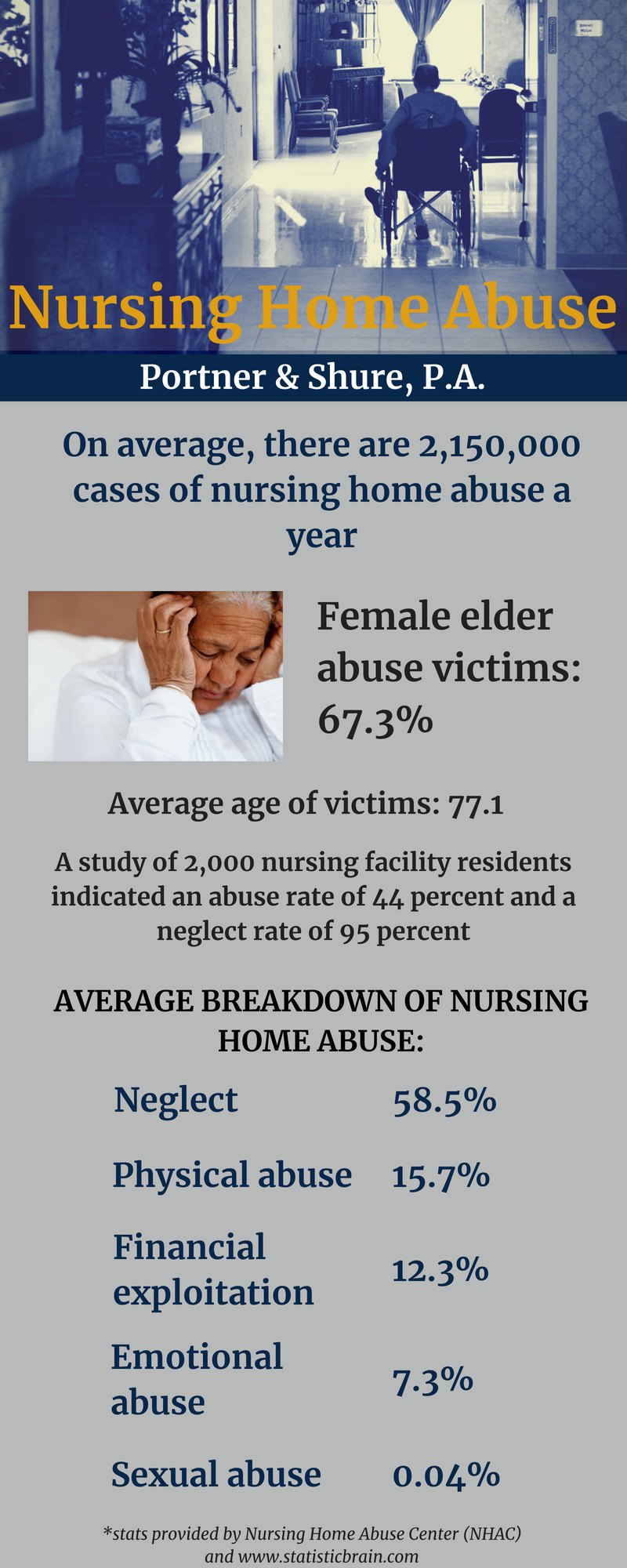
Nursing home negligence can occur in various forms:
- Physical Abuse
- Medical Negligence, Malpractice and Neglect
- Sexual Abuse
- Emotional or Psychological Abuse
- Abandonment
- Financial Exploitation
- Self-neglect
- Resident’s Rights
Signs of Physical Abuse of Nursing Home Patients
Physical nursing home or elder abuse is the use of physical force that may result in bodily injury, physical pain, or impairment. Acts of violence such as hitting (with or without an object), pushing, shaking, slapping, kicking, pinching and burning can all be categorized as physical abuse. Other examples of physical elder abuse may include inappropriate use of drugs and physical restraint, force-feeding and physical punishment of any kind.
Signs and symptoms of this kind of physical abuse include but are not limited to:
- Bruises, welts, lacerations, burns
- Broken bones, and skull fractures
- Cuts, punctures and other lacerations
- Sprains, dislocations, and internal injuries/bleeding
- Broken eyeglasses/frames, and signs of being restrained
- Findings of medication overdose or under utilization of prescribed drugs
- A nursing home resident’s report of being hit, slapped, kicked, or mistreated
- A nursing home resident’s sudden change in behavior
- A nursing home worker’s refusal to allow visitors to see a nursing home resident alone
Medical Negligence, Malpractice and Neglect in Nursing Homes
Neglect of residents is one of the highest reported incidents of nursing home abuse. Nursing home neglect includes the refusal, failure or inability to provide a nursing home resident with such life necessities as food, water, clothing, shelter, personal hygiene, medicine, comfort, personal safety, and other essentials included in an implied or agreed-upon responsibility to a resident. Malpractice or medical negligence can occur when illness or injury goes untreated or mistreated, when the wrong medicines are given or the proper ones are with held, or when a resident’s medical needs are otherwise improperly handled by the nursing home staff.
Signs and symptoms of neglect and medical negligence include but are not limited to:
- Dehydration, malnutrition, untreated bedsores, and poor personal hygiene
- Unattended or untreated health problems
- Hazardous or unsafe living condition/arrangements
- Unsanitary and unclean living conditions (for example, dirt, fleas, lice on person, soiled bedding, fecal/urine smell, inadequate clothing)
- A nursing home resident’s report of being mistreated
Recognizing Signs of Sexual Abuse in a Nursing Home
Sexual abuse in a nursing home setting occurs when there is non-consensual sexual contact of any kind between a nursing home resident and another resident, an employee or a visitor. Sexual contact with any person incapable of giving consent is also considered sexual abuse.
Signs and symptoms of sexual abuse include but are not limited to:
- Bruises around the breasts or genital area
- Unexplained venereal disease or genital infections
- Unexplained vaginal or anal bleeding
- Torn, stained, or bloody underclothing
- A nursing home resident’s report of being sexually assaulted or raped
Recognizing Signs of Emotional or Psychological Abuse in a Nursing Home
Emotional or psychological abuse in a nursing home setting occurs when there is the infliction of anguish, pain, or distress through verbal or nonverbal acts. Emotional/psychological abuse can include insults, threats, intimidation, humiliation, and harassment. In addition, treating a nursing home resident like an infant; isolating a nursing home resident from his/her family, friends, or regular activities; giving a resident the “silent treatment;” and enforced social isolation are examples of emotional/psychological elder abuse.
Signs and symptoms of emotional/psychological abuse include but are not limited to:
- Being emotionally upset or agitated
- Being extremely withdrawn and non communicative or non responsive
- Unusual behavior usually attributed to dementia (for example, sucking, biting, rocking)
- A nursing home resident’s report of being verbally or emotionally mistreated
Abandonment by Nursing Home Staff
A nursing home worker, who has assumed responsibility for providing care for a resident, but then deserts that resident is characterized as abandonment.
Signs and symptoms of abandonment include but are not limited to:
- A nursing home resident’s own report of being abandoned
Financial Exploitation of Elderly Nursing Home Residents
The illegal or improper use of a nursing home resident’s funds, property or assets constitutes financial exploitations. Examples include, but are not limited to, cashing a nursing home resident’s checks without authorization/permission; forging a resident’s signature; misusing or stealing a resident’s money or possessions; coercing or deceiving a resident into signing any document (contracts or will); and the improper use of conservatorship, guardianship, or power of attorney.
Elder abuse signs and symptoms of financial or material exploitation include but are not limited to:
- Sudden changes in bank account or banking practice, including an unexplained withdrawal of large sums of money by a person accompanying the nursing home resident
- The inclusion of additional names on a nursing home resident’s bank signature card
- Unauthorized withdrawal of the nursing home resident’s funds using the resident’s ATM card
- Abrupt changes in a will or other financial documents
- Unexplained disappearance of funds or valuable possessions
- Substandard care being provided or bills unpaid despite the availability of adequate financial resources
- Discovery of a nursing home resident’s signature being forged for financial transactions or for the titles of his/her possessions
- Sudden appearance of previously uninvolved relatives claiming their rights to a nursing home resident’s affairs and possessions
- The provision of services that are not necessary
- A nursing home resident’s report of financial exploitation.
Self-neglect – In Nursing Homes
Self-neglect is characterized as the behavior of a nursing home resident that threatens his/her own health or safety. Self-neglect generally manifests itself in a resident as a refusal or failure to provide himself/herself with adequate food, water, clothing, shelter, personal hygiene, medication (when indicated), and safety precautions. The definition of self-neglect excludes a situation in which a mentally competent nursing home resident, who understands the consequences of his/her decisions, makes a conscious and voluntary decision to engage in acts that threaten his/her health or safety as a matter of personal choice.
Signs and symptoms of self-neglect include but are not limited to:
- Dehydration, malnutrition, untreated or improperly attended medical conditions, and poor personal hygiene
- Hazardous or unsafe living conditions/arrangements (for example, improper wiring, no indoor plumbing, no heat, no running water)
- Unsanitary or unclean living quarters (for example, animal/insect infestation, no functioning toilet, fecal/urine smell)
- Inappropriate and/or inadequate clothing, lack of the necessary medical aids (for example, eyeglasses, hearing aids, dentures)
- Grossly inadequate housing
Nursing Home Resident Rights
Nursing home residents have patient rights and certain protections under the law. The nursing home must list and give all new residents a copy of these rights.
Resident rights usually include:
- Respect: The right to be treated with dignity and respect.
- Services and Fees: You must be informed in writing about services and fees before you enter the nursing home.
- Money: The right to manage your own money or to choose someone else you trust to do this for you.
- Privacy: The right to privacy, and to keep and use your personal belongings and property as long as it doesn’t interfere with the rights, health, or safety of others.
- Medical Care: The right to be informed about your medical condition, medications, and to see you own doctor. You also have the right to refuse medications and treatments.
Infographic: Nursing Home Abuse
(Portner & Shure, P.A.)
